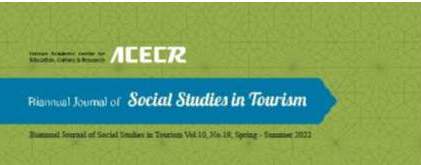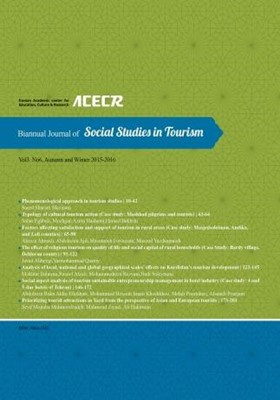-
-
List of Articles
-
Open Access Article
1 - Phenomenological approach in tourism studies
Saeed Shariati -
Open Access Article
2 - Typology of Cultural Tourism Action (Case Study: Mashhad pilgrims and tourists)
Sahar Eghbali Mozhgan Azimi Hashemi Hamed Bakhshi -
Open Access Article
3 - Factors Affecting satisfaction and support of tourism in rural areas (Case study: Masjedsoleiman, Andika, and Lali Counties)
alireza ahmadi -
Open Access Article
4 - The effect of religious tourism on quality of life and social capital of rural households (Case Study: Bardy village, Dehloran County).
Javad Alibeigi -
Open Access Article
5 - Analysis of Local, National and Global Geographical Scales’ Effects on Kurdistan’s tourism development
Mokhtar Bahrami -
Open Access Article
6 - Social Aspect Analysis of Tourism Sustainable Entrepreneurship Management in Hotel Industry Case Study: 4 and 5 Star Hotels of Tehran
Abdoreza Roknodin -
Open Access Article
7 - Prioritizing Tourist Attractions in Yazd from the perspective of Asian and European tourists
Mojtaba Mahmoodzadeh
-
The rights to this website are owned by the Raimag Press Management System.
Copyright © 2017-2025







